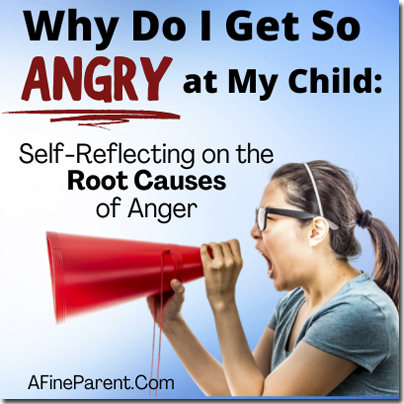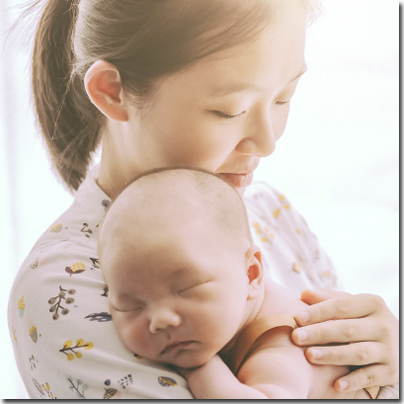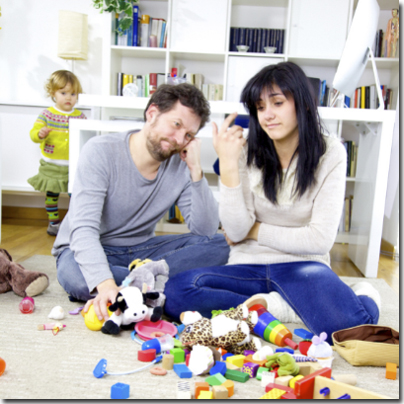 Once, as I stepped up to speak with a group of parents, the woman in charge introduced me with these words: “Here’s Jill, the Anger Mom.”
Once, as I stepped up to speak with a group of parents, the woman in charge introduced me with these words: “Here’s Jill, the Anger Mom.”
I thought, there are titles I’d rather be labeled. Pastor and change expert. Lord of the Rings fanatic. Generic “writer and speaker.” I’d take Crazy Cat Lady over “Anger Mom.” It wouldn’t be wrong.
“Anger Mom,” though, is what I’ve become to a couple generations of parents needing someone who’s walked the journey from angry parent to peaceful home. It’s the most popular topic chosen from my speaking list. I believe that’s because none of us ever expected to turn into that parent.
Unprepared for Anger
 Parenthood is one of the biggest changes a human can experience. We notice this even on a molecular level. During pregnancy, fetal cells enter the maternal circulation and maternal cells enter the fetal circulation—giving women a different genetic background within their own bodies!
Parenthood is one of the biggest changes a human can experience. We notice this even on a molecular level. During pregnancy, fetal cells enter the maternal circulation and maternal cells enter the fetal circulation—giving women a different genetic background within their own bodies!
Pregnancy and motherhood also alters brain structures, making us more attuned to our offspring. Writer Kaitlin Miller lists 29 ways our life changes when we have children—and we know there are countless more. I definitely stopped being a champion sound sleeper!
One’s identity, previously centered in the self, suddenly and irrevocably becomes tied to a little human outside of oneself. You’re still you—but part of you is always and forever also “parent.” This new label may feel awkward, like a new shirt that hasn’t quite softened up with washing. You will never be quite the same person again. It’s a seismic shift we can’t see coming, and with it come all manner of both welcome and unwelcome emotions.
Writer Anne Lamott said, “There really are places in the heart you don’t even know exist until you love a child.” There are also, however, places in our soul that we had no idea could get so angry, even at things that later feel so insignificant. I wasn’t prepared for that side of me before I had three kids under five.
As parents, many of us may find ourselves feeling anger and allowing that to translate to outward anger at our kids. We may then feel guilt and shame because we yelled at the same kids we would also take a bullet for.
Love and anger commingled creates a confusing mix of guilt, shame, and frustration that we will want to get a handle on above most any emotion we feel, as parents, toward our kids.
Yet emotions themselves aren’t bad; in fact, they are actually healthy. It’s good that we can feel anger as human beings! Anger helps the human race to fight injustice, to protect its weak ones, and to change systems that harm others. Feeling guilty that we have the emotion of anger is like feeling guilty that we have arms—we need all the parts of our human selves.
How that anger works out, however, can be healthy or unhealthy. We know that directing it at our kids, or ourselves, isn’t the answer. So what is? The first step to de-escalating anger is understanding where it comes from and how it manifests itself in our minds.
There are more reasons we get angry than what we probably realize. Many of these reasons can be broken down into bodily health or social causes for anger. Read on to understand more about the reasons we might feel so angry.
Bodily Health Causes for Anger
1. Lack of Sleep
 Some angry feelings can arise from our own bodies’ warning signs. Exhaustion is a major culprit. Lack of sleep makes anyone cranky—and lack of sleep is legendary when you’re a parent. As difficult as it is, grabbing rest where we can is so important in handling our angry feelings. This could include:
Some angry feelings can arise from our own bodies’ warning signs. Exhaustion is a major culprit. Lack of sleep makes anyone cranky—and lack of sleep is legendary when you’re a parent. As difficult as it is, grabbing rest where we can is so important in handling our angry feelings. This could include:
- Getting into bed at as close to the same time as possible every night
- Sacrificing other good things, temporarily, to get those eight hours in
- Finding nap time
- Cutting out caffeine, which is a leading cause of lack of sleep
- Trying to find some downtime during the day to sit with a glass of water and rest
- If you pray, this solitude is a great way to soothe emotions and talk out feelings.
Telling our partner that we need some alone time—and then taking it—feels difficult for a lot of parents, especially mothers. One way to help defuse anger is to regularly talk to our partner (or another helper) about our physical and mental needs and then make a plan for how we will get what we need.
2. Mental Health
Mental health also plays a role in the physical causes of anger. Anger can often be a presenting sign of depression, anxiety, OCD, or other medical conditions we should not blame ourselves for.
For me, anemia, migraines, and a poorly functioning thyroid plagued my emotional health, and I was clueless until seeing a doctor. The lesson here is—take care of your health! Consult a professional if you have any inkling that physical or mental issues could be affecting your moods.
 3. Physical Health
3. Physical Health
Exercise and diet matter, too. You knew I’d say that, right? Most of us know how much exercise and diet affect our bodily health, but did you know they play a huge role in our mental health, too?
The Mayo Clinic suggests exercise to alleviate angry feelings. We’ve all experienced how a good dance off or quick walk can change our mood! We also know what a good meal can do to those “hangry” rumblings. Yet, despite this knowledge, we often neglect ourselves in our focus of caring for others. Self-care is the first offense toward a peaceful home.
Social Causes for Anger
1. Unrealistic Expectations
Unrealistic expectations—those we have for ourselves and those others have for us—can create an environment ripe for anger issues.
We have this perfect family picture in our heads, and our culture reinforces it. We believe we should:
- Have family vacations like the ones we see on Facebook
- Have home decor like everyone else’s on Pinterest
- Have children like all those perfectly groomed kids on Instagram
Self- and culture-imposed expectations can lead us to feel anger when our families don’t fulfill expectations. A child who “ruins” the family photo by muddying her dress earns our ire, when the true target is the expectation we had in our minds of how a family “should” look.
When my girls were 4 months old, 4 years-old, and 5 years-old, we moved to a new city. The second week there, we’d begun going to a new church and sending the girls to the summer Bible program. At the end of the week, all the kids marched up to the stage to sing the songs they’d learned and to recite the Bible verses.
My daughter, front row, had insisted on dressing herself that morning. She wore her favorite polka dot dress with tiny buttons up the front. I realized right away, as she swung her arms with the music, that she had failed to button her dress beyond her navel. Worse, I noticed soon after, she had forgotten an important item that morning…underwear. So there was our four-year-old, singing and swinging and showing the entire new church her everything.
I sank into the chair and contemplated options. Then I had a light bulb moment. From that day forward, I realized, no one there would expect anything of me at all. I’d started at the bottom as a mom. All I could do was go up.
It was incredibly freeing. It was also a good experience in releasing how much I cared about others’ expectations.
Relationship experts Linda and Charlie Bloom suggest trying to focus on our experiences, the quality of our lives rather than the quantities, and gratitude to help conquer what is essentially FOMO (Fear of Missing Out).
This belief that others’ expectations should be our own can cause anger when reality doesn’t match.
Learning to release expectations meant learning to view the kids, house, and myself as works in progress. I needed to remember that strangers on the internet don’t run my life and my choices—I do. Now, we intentionally take family photos that show the real us. That’s one way to fight the expectations that lead to anger.
The criticism of people who aren’t strangers, however, often hurts the most. If we aren’t prepared to react positively, it can be easy to turn the side eye of that person in church or our own mother’s “My, that girl is spirited!” into anger directed toward our kids. Embarrassment often translates into angry reactions toward the children who appear to be causing our shame. Clinically, shame-created anger results from a feeling of being criticized—a feeling parents know all too well.
Too many times when my kids were young I felt the sting of a person’s comment as an attack on my own capability. Ashamed and embarrassed, I turned my emotions on my children because I hadn’t developed the confidence to let others’ expectations bounce off my back.
I had to get brave enough to tell zealous family and friends that these were our choices. We weren’t perfect. If the individual cared about us they could stay tuned; but it was too early and inappropriate for them to make a judgment call on us.
If the criticism was valid, I learned to say, “I’m sorry” for any behavior that harmed others and to leave it at that apology and restitution. Another person’s expectations of what I should do as a parent were no longer my issue. I would not allow that person’s desire for us to be something different cause me to become angry at my kids.
We can learn to use self-talk to defuse those expectations. When a situation arises that begins to make us feel anger, we can take a breath and ask ourselves a few questions, such as:
- How important will this be in five years?
- What matters right now at this moment?
- Is what I’m expecting right now realistic?
- Why do I expect it?
- What’s the worst or the best that can happen here?
2. Cluttered Lives
 Another social cause of anger in parents is our packed schedules and busy lives.
Another social cause of anger in parents is our packed schedules and busy lives.
I often feel stressed if my environment or calendar is cluttered. While I wasn’t initially aware of this, it resulted in anger when life felt chaotic. I used to try to solve this by organizing our stuff or being really good at time management. Instead, I needed to jettison all but what we really needed and wanted in order to feel calm enough so anger didn’t get the best of me.
Saying no to some things can help us better say yes to peace. This may mean:
- No to more on our calendar
- No to excess in our house
- No to one more activity
- No to one more sport or kindergarten-prep class
- No to one more toy or device
Simplifying our calendars and our homes defuses the anger that can gather when we’re stressed out from chaos in our schedule or home.
Family therapist Mindi Saari suggests a 30-day challenge in which we put down our devices, unplug, and breathe for one day a week. In my profession, this is called a sabbath. For most of us, it’s nearly impossible to imagine giving up our devices for an entire day. Yet the link between anger and overdriven lives is undeniable.
During the current transition out of quarantine and COVID, as we’re slowly returning to “normal,” maybe we should all be asking ourselves—do I want my old normal? Might I choose to get rid of some activities, toys, or plans so that we can all have breathing room? You’ll be amazed what it does for your anger levels!
3. Patterns of Anger Management
 Another social cause of anger includes the emotional patterns we learned in our family of origin. I’m the child of a stoic Swedish-American mother, which influenced my learning that emotions are not okay. “Negative” feelings were presented as shameful and we were taught to pretend they didn’t exist.
Another social cause of anger includes the emotional patterns we learned in our family of origin. I’m the child of a stoic Swedish-American mother, which influenced my learning that emotions are not okay. “Negative” feelings were presented as shameful and we were taught to pretend they didn’t exist.
Even excessive “positive” emotions were suspicious in our house. Needless to say, I never learned that all emotions are healthy, nor how to express them well. When anger felt overwhelming, it came out in ways that were not good for any of us.
Some of us learned patterns of ignoring anger, while other parents taught us to let it all out in one massive explosion that quickly flamed out. Some of us learned to blame others, while others, sadly, learned abuse. Psychotherapist Buck Black suggests we can learn to break a destructive cycle only when we recognize it.
My dad smoked in the house, so I grew up believing that smoke permeating the house was “normal.” Whatever it is that we inherit from our childhood often ends up feeling like it is the only way. As adults, we have the ability to take a step back and look at the patterns we learned as children. Taking the time to do this can allow us to see more clearly why we react as we do when we’re angry and how to turn away and create a new pattern.
Personally, I had to slowly change the way I felt about emotions and how to communicate to my kids that they are healthy and good. The good news is, we can always change a trajectory. We never have to be who we were.
Structural Causes of Anger
Feeling anger towards our kids can also be the result of our own lack of a plan. We may have great intentions to discipline calmly, but the first time a child steps a toe across the line, all of those intentions evaporate and we can turn into Mrs. or Mr. Incredible Hulk.
Why? Because we didn’t plan what we would do when that toe touched the line.
Having an agreed-upon plan for when a child disobeys helps us to step back from the behavior and our own rising emotions over it. It allows us to look at the plan already agreed on to decide what to do. You hit your sister? Well, what did we agree would happen if you did that? You chose to leave your toys outside? What is the consequence for that?
A good plan requires consistent follow through. It also requires that we place a healthy amount of choice on our children for their behavior.
I once had a woman relay her child’s bathtub story in hopes of relief. Her son refused to get out of the bathtub and get dressed in the morning. They were always late for school. They got into a huge argument every day about this.
I coached her through making a plan. What would happen if you gave your son his clothes and set an alarm? Let him know that after the alarm, he has five minutes to be dressed and done. After five minutes, he knows you’re going to shut off the lights and drain the water. Also, let him know the next time he’s late, he has to explain why to the office staff. Would that allow you to disengage from the argument? Could you stick to that agreement and not allow anything to lead you down the road of angry exchange?
It’s both respectful and healthy to give our children the onus of choosing their own consequences. Giving them age-appropriate responsibility for their own actions allows us to take ourselves out of a potentially angry interaction and calmly say, “Hey, you chose to have to explain yourself to the office staff today. I bet you can choose something else tomorrow.”
Family therapist and coach Nicole Schwarz writes about how important it is to recognize when we are trying to carry the emotions for our child or solve their problem for them. Being able to recognize this allows us to disengage emotions and encourage our children to find good solutions by themselves. Schwarz’s steps for managing emotions echo what’s been said here:
- Respond, don’t react
- Make it safe for your child to tell the truth and feel loved
- Be curious, not angry, about what is causing the behavior
Most of the time, the emotion underlying our anger is fear. Sometimes, that leads us to quickly reprimand a child who is wandering into the street. Other times, it dwells mercilessly on our fear of failure or embarrassment to create a situation where it’s easy to get angry.
If you feel like an “Anger Mom,” don’t despair. You’re definitely not alone. We can all use some help in changing that trajectory from chaos to calm.
The 2-Minute Action Plan for Fine Parents
The next time you feel angry, try out a few exercises. Make note of what works for you and add it to your “go to” list of strategies:
- Sit down
- Breathe deeply and count to ten
- Imagine a relaxing place
- Ask yourself what triggered your feelings. Ask what deeper emotion or need caused you to feel that way.
- Listen to your body tell you how it feels. Talk to your child about your feelings and how you can both create calm together in this instance.
The Ongoing Action Plan for Fine Parents
Which cause of anger resonated with you the most? Take some long-term action steps to work on that cause. This may mean one of the following:
- Get a chart to create a plan for when your child disobeys. Create it together to encourage accountability on both of your parts.
- Find a therapist to work through the patterns you learned as a child. (Definitely do this if you learned abuse).
- Spend some time with your family brainstorming how to pare down your schedule together or work together to declutter and put stuff in bags to give away.
- Try a sabbath rest from devices, media, and activities to concentrate on each other.


Dear Jill,
I love what you say in this article. Planning our actions ahead and letting kids know what the consequence is to be are so very important. One of the points I make in my communication course is that our culture (as well as many others) is uncomfortable with anger and sadness, and yet these are legitimate emotions. It’s all in how we behave when we feel them, and that’s where the preplanning comes in.
I invite you and your readers to my webpage blogs at Creating ResponsibleKids.com. My blogs are all about helping parents and teachers teach children and adolescents HOW to become responsible for their behavior, and I believe you and I are on the same page.
Warm Regards, Judy Harmon Holmes, Ed. D.
Thank you. I think you’re so right–we are very uncomfortable with anger and sadness. It’s not healthy. I love that you’re doing this work.
I am constantly struggling Dr. Jill. I come from an extremely abusive family. My mom abused us and my dad as well.
It’s hard to unlearn what you’ve already learnt. I don’t want to be like my mom. Your words gave me hope and I’m on my way to implement these tactics in my life. Gratitude.
Oh Nazia, I am so sorry that was your experience. It makes my cry a little to hear you say this gives you hope. You are more than your background. You can change the cycle!